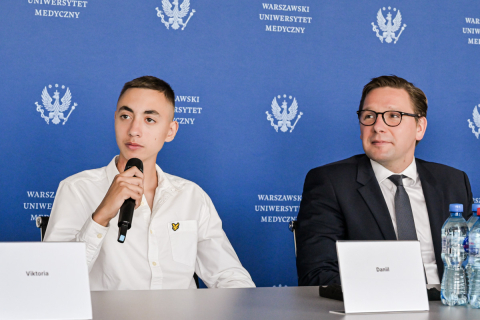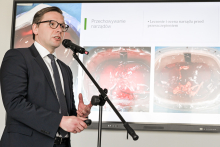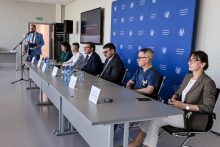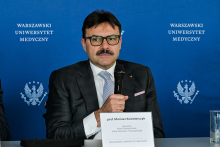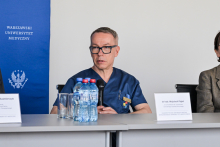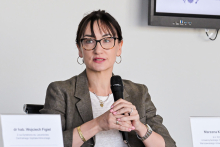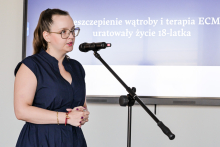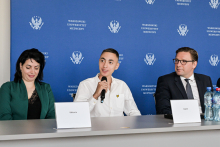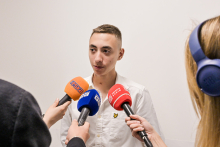Our university’s experts reported this clinical success at a press conference held today at WUM. Danił, the eighteen-year-old patient, was also present. He assured that he already feels very well and thanked the physicians for saving his life.
The patient’s condition
“Our patient suffered liver damage in early childhood as a result of a traffic accident,” said Professor Michał Grąt, Head of the Department of General, Transplant and Liver Surgery at the WUM University Clinical Center and national consultant in clinical transplantation. “Over time, he developed liver cirrhosis, which was very advanced, accompanied by severe portal hypertension, making organ transplantation extremely difficult,” explained the professor. “However, the most serious problem was extremely severe hepatopulmonary syndrome. This complication results in the opening of connections through which blood bypasses the lungs without undergoing gas exchange and flows directly to the heart. As a result, the patient breathes, but the body does not receive proper oxygenation. The only chance for such patients is a liver transplant.”
How the procedure was performed
The transplantation was performed on January 9 of this year. The organ came from a deceased donor, and the operation was extremely difficult, performed with the use of ECMO (extracorporeal membrane oxygenation). It is a method of supporting circulation and breathing, in which the patient’s blood is drawn outside the body, oxygenated in a special device, and returned to the venous system. In this case, veno-venous ECMO was used, with the main goal of replacing lung function and ensuring oxygenation of the body when conventional mechanical ventilation proves insufficient. The ECMO therapy was managed by a team of cardiac surgeons under the leadership of Professor Mariusz Kuśmierczyk, Head of the Department of Cardiac and Thoracic Surgery and Transplantation at the WUM University Clinical Center and national consultant in cardiac surgery.
Use of extracorporeal membrane oxygenation (ECMO)
The eighteen-year-old required ECMO support both before and after surgery. This was one of the longest ECMO therapies of this type worldwide in a patient before and after liver transplantation. In total, Danił remained on veno-venous ECMO for 48 days (with a nine-day break). According to the most up-to-date scientific literature, the use of veno-venous ECMO after liver transplantation due to severe hepatopulmonary syndrome has been described in only seven adult patients, of whom only five survived.
“Unfortunately, liver transplantation often temporarily worsens an existing hepatopulmonary syndrome. Improvement may take up to several months,” said Professor Grąt. “We know that a liver transplant will reverse hepatopulmonary syndrome, but we do not know when. When Danił was still unconscious, we did not know how it would all end. His mother asked me at that time, ‘How much longer? When will he start breathing on his own?’ I answered that I did not know and that no one did. We had to wait. And it did happen.”
“The greatest joy for us is to see our patient in very good condition,” said Professor Kuśmierczyk. “And we still remember him two or three months earlier, when he was on the verge of death and we were fighting to bring him back to life.”
Interdisciplinary perioperative care
The rescue was possible thanks to exceptional cooperation between many specialist teams.
“Through proper diagnostics, appropriate treatment, specialist outpatient care, and rehabilitation organized in a complementary way, we managed to provide comprehensive care tailored to our patient’s needs,” emphasized Marzena Kowalczyk, Acting Director of the WUM University Clinical Center.
Continuous monitoring of the patient’s condition took place in the Department of Surgical Intensive Care (SICU) at the WUM University Clinical Center under the supervision of Dr. hab. Wojciech Figiel, with cardiological support from the 1st Department of Cardiology at the WUM University Clinical Center, headed by Professor Marcin Grabowski. The patient was later treated in the Department of Hepatology led by Professor Joanna Raszeja-Wyszomirska. The nursing teams of the SICU, the Department of General, Transplant and Liver Surgery, and the Department of Hepatology, Transplantation and Internal Diseases also provided care.
“It is fair to say that there was hardly any anesthetic complication that Danił did not experience and survive, with one fortunate exception – he had no neurological complications,” said Dr hab. Wojciech Figiel. “That is why he is with us today, and on September 1 he will go back to school. For me as an anesthesiologist, this was an enormous challenge, but also an enormous source of satisfaction.”
Development of Polish transplantation
During the conference, our university’s experts emphasized the tremendous progress being made in transplantation today. They mentioned innovative procedures carried out at the MUW University Clinical Center, such as split liver transplantation, auxiliary liver transplantation, transplantation of a liver segment from a living donor to an adult recipient, and multiorgan transplants such as heart-liver and heart-kidney. The development of Polish transplantation was also highlighted at the conference by Magdalena Kramska from the Department of Medical Care at the Ministry of Health, especially in the context of initiatives undertaken by the ministry. She spoke about funding equipment for anesthesiology and intensive care units, building a hospital system for quality donation, expanding the network of transplant coordinators, and fostering international cooperation.
